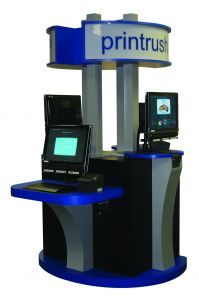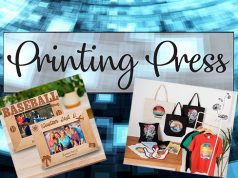
With the comfort-level issue now clearly out of the way, manufacturers have moved on to bigger and better things with regard to the kiosk market. Faster uploads, better GUIs, expanding photo gift offerings—you name it, and the kiosk/retail print market is delivering.
With the focus now squarely on improving the experience, kiosk manufacturers are more concerned with addressing market trends. With the “look at me” generation in full swing this category could be entering its sweet spot.
“We're moving past the 'digital age' and into the 'age of expression,'” said Stephen Giordano, CEO of Lucidiom (which was acquired by Noritsu).
Kodak's Worldwide Marketing Manager for Kiosks, Rowan Lawson, has another word for it: an era of “personalization.” Whatever you choose to call it, it amounts to the same thing: an explosion of product choice for consumers, multiple production platforms for retailers, a blending of virtual and physical consumer touch-points and, hanging above it all, the persistent urgency of marketing it to consumers drifting away from traditional printed products.
So-called “expression” products—the merchandise that includes cards, photo books, calendars, etc.—have fared far better during the recession than digital cameras, Giordano said. Retailers can't afford to be wary of products such as photo books because of the higher price point, as they will be key to increasing the dollar and margin sale at retail. “These products have, on average, 63 percent margin,” he noted.
Noritsu's President and CEO, Yukihiko Chayama, pointed to the profit potential in this space as well, adding, “It is where the real profit lies for retailers today. While 85 percent of this market is still photo prints and only 15 percent is creative products, that 15 percent is responsible for 80 percent of the profits. We feel that our new product portfolio is allowing retailers realize this profit potential.”
To profit in the new era of photo output, retailers mustn't simply update their output equipment, they must update the retail environment. Shopping has become a more self-consciously social experience and retailers need to pay more attention to the theatrical aspects of how they present their photo solutions. If consumers are going to spend more on their photo products, they need to be made to feel that the entire experience is higher-touch. And while all these “lifestyle” photo products remain hot button items, let's not dismiss the continued importance of the venerable 4 x 6 print. The 4 x 6 is not irrelevant. Indeed, for all the interest in the new crop of merchandise, the 4 x 6 remains the bedrock. “The standard print is still the largest revenue generator,” Fuji's VP of Marketing, John Meyers, pointed out.
“The volume model of the 4 x 6 is not gone,” Lawson added. “It's very competitive from a price point perspective but it's still robust.” It should be the foundation for retailers to branch out into emerging categories, but if those retailers want growth, Lawson said, as they need to diversify.
PMA itself expects the 4 x 6 market to bottom at 15 billion to 16 billion prints, where it will stay for the foreseeable future. Demand for 4 x 6 prints at retail and online actually grew from 10.5 to 10.6 billion prints in 2009, suggesting at least a little wind left in the sails. Indeed, retailers no longer have to necessarily worry about print competition from home printers, Meyers said, they've won the battle over where the prints will be made. Now they just need to ensure they're going to be made, and made larger and into more creative things in the first place.
All that being said, let's take a look at some front-end technology in the retail print equation which, of course, means kiosks. Here's a rundown on some of the latest, many of which made their debut at the recently concluded PMA Show in Anaheim, Calif.:
DigiLabs Gets Creative
DigiLabs showcased their impressive photo creativity software. End-users can create and order photo products using DigiLabs software either in-store or at home. DigiLabs software creates a print-ready PDF (or JPEG) file and does not require server software so that the print-ready file is delivered directly to the printer.
Four photo industry leaders: Duplo, Noritsu, DigiLabs and Ultimate Technographics have recently presented an end-to-end automated workflow for creating, ordering, imposing, printing and finishing photo products (e.g., books, cards, calendars, prints, etc.).
The integration between DigiLabs and Duplo's Bar Code Generator (powered by Ultimate's Impostrip) imposition software is automated so that upon delivery of the order, the Bar Code Generator automatically imposes the job, including page layout, numeration and bar coding. From there, the file moves to the Noritsu printer (model D703) and upon printing, is taken to Duplo's DC-645 Integrated Folding System and UAS-400 Photo Album System for slitting, cutting, creasing, folding and binding.
This unique and powerful integrated workflow was demonstrated at Duplo's booth and just across from there were in-depth presentations of DigiLabs' new photo software.
“We are excited to deliver an integrated photo workflow solution with our partners, thereby delivering to photo products merchandisers superior user/ordering experience, speed, quality and efficiency,” says Andrew Friedland, VP of Sales at DigiLabs.
Si Nguyen, Director of Marketing at Duplo USA Corporation, comments, “Workflow automation begins with prepress in a print production environment.”
KIS Photo Me Photobook Maker
For KIS Photo-Me Group the focus has been on the DIFM (Do It For Me) customers as their Photobook Maker kiosks do exactly that—and with amazing speed. The freestanding kiosks combine new software that allows users to produce complete photobooks with a just a few clicks in about six minutes. The software automatically arranges pictures into an aesthetic layout based on archival details and photo orientation. Stain-resistant and scratch-proof paper ensure KIS Photobooks are printed and bound to last. Up to 30 pages and 90 photos can be included in each KIS Photobook. Yet another relatively inexpensive option for retailers in the still red hot photobook market.
DNP Photo Imaging America Corp.
DNP has announced an interesting partnership with Mediaport Entertainment Inc. to offer on-demand music download functionality in their multi-function PrintRushMP kiosks. This new service unites DNP's reputation in the retail photo market with Mediaport's background and experience in digital content distribution and fulfillment.
DNP's PrintRushMP combines multiple order stations—usually two or more—with a high-speed photo print tower and the capability to create items, as they explain are not usually associated with a photo kiosk. PrintRushMP, with Mediaport music functionality, becomes a new self-service destination for consumers at retail.
“PrintRushMP also features an expandable product catalog, allowing a retailer to enhance their ROI by selectively adding new and profitable digital services. With Mediaport's competitively priced music service, consumers browse and select individual tracks or albums and create compilations,” DNP adds. Consumers then receive their order on a custom-printed CD or directly to an attached USB device or media card, delivering media that works with virtually any media play device.
Fujifilm GetPix
The Fujifilm/Xerox partnership continues as the fully automated GetPix combines Fuji Xerox printing technology and Fujifilm's proprietary Image Intelligence Technology. The setup can instantly produce finished and folded fun books, fun cards and fun calendars ranging in sizes from 6″ x 6″ up to 5.5″ x 8.5″. This system, when combined with Fujifilm's ASK 2500 and ASK 4000 dye sublimation printers, becomes a complete instant kiosk solution. Fuji told us they are expecting units to be available to retailers by this summer.
At their PMA booth, they showcased a close-up look at the new GetPix F7 kiosk terminal and GetPix Version 5.0 software that, “provides a simplified order process along with Fujifilm's proprietary Image Intelligence® technology for exceptional print quality.” Together, these latest innovations provide what Fujifilm says is a new and improved user interface that enables consumers to order photo products ranging from high-quality standard prints and enlargements to duplex photo books and assorted gift items.
Look for lots of new additions with regard to the company's print fulfillment end of the equation as well.
Sony PictureStation
Sony explains that their latest PictureStation system incorporates all of the benefits of Sony's turnkey photofinishing kiosks with options retailers can customize for their sales environment as a compact countertop unit or a standalone kiosk. They tell us the possibilities for this evolving concept, called a “digital destination,” in retail stores are endless, as, “Sony has the ability to bring together content and technology like no other company.”
Sony claims the small footprint and simple operation of PictureStation means there is no need to hire or train additional staff. Additionally, retailers have the choice of offering customers a networked or closed system, which enables users to either send their photos from their home computers or smartphones to the kiosk, or use their cameras' memory card, CD/DVDs or other memory media to deliver their photos for finishing.
Belinda Lopresti, Senior Marketing Manager for Sony's Digital Photofinishing Division, explained, “We've taken our kiosk and wrapped other Sony products around it to help these dealers get back into the category. This can be a low-cost toe-in-the-water for some dealers.”
Kodak Picture Kiosks
Kodak's 2010 PMA was about “building on its legacy of market firsts in retail print to enable retailers to deliver an exceptional photo center experience to their customers; at the same time, we continue to help our retail partners create vibrant and reliable photo retail profit centers.”
They showcased this in the form of their modular, highly flexible photo retail solution, consisting of Kodak Picture Kiosks and APEX. New features on the kiosk include:
• Kodak Video Snapshots Feature – lets consumers quickly and easily review and select individual frames from their video files, convert them into still images, and then use those pictures to create prints, collages, greeting cards, photobooks and calendars, or store them on a photo CD. This represents a huge, untapped opportunity in retail printing that can help retailers grow their profits.
• Kodak Pet Eye Retouch Feature – allows consumers to fix the very common and problematic pet eye glare caused by flash photography of their four-legged companions.
• Kodak Facial Retouch Feature – This new feature/service uses Kodak technology to help smooth wrinkles, diminish and/or erase blemishes and improve skin tone.
There are lots of new features on the back end as well with APEX updates and additions.
HiTi Digital Wireless
The HiTi Digital solutions in the kiosk market are more about providing mobility to the event photographer—a business more and more retailers are beginning to look into. The entire event photography category has undergone somewhat of an evolution in recent years as more amateur photographers have taken to the streets with some of the newer equipment to grab a piece of this burgeoning market.
Designed as easily movable, standalone roll-type printers and weighing less than 20 lbs, the P510S and P510Si (wireless capability) bring the flexibility and quality needed to do on-site photo finishing at a low cost—the combination so many in this space are truly after.
HiTi Digital is also showcasing the freedom of printing mobility and how that can be obtained simply by powering up the HiTi P110S mobile photo printer with the fully charged battery pack PB-110. The unit also comes with an optional carrying bag when the unit is being transported from location to location. New and improved versions of their HiTi P510K All-in-One Mini Photo Kiosk have also been introduced.
Noritsu/Lucidiom
With the details of this acquisition ironed out, the focus is squarely on solutions, and the Noritsu/Lucidiom tandem had plenty of those at PMA 2010.
Among those solutions in the kiosk arena is the Photo Finale 7.0 that, as Lucidiom explains, is a perfect solution for photo retailers looking to replicate the in-store kiosk experience for their online customers. Photo Finale 7.0 features the full kiosk product line and straightforward transactions. “Photo Finale offers all the whimsy, creativity and universal appeal needed for retailers to thrive in today's social picturing world. In version 7.0, the APM photo kiosk and Photo Finale now use the same creative product engine, so the retailer can offer all the same content and products on his kiosk and Web site,” they explain. The new version also incorporates the Lucidiom Store—Lucidiom's central fulfillment service for traditional photo products, hundreds of custom photo gifts, plus standard and multi-page creative products like photo books and calendars.
“Retailers can choose to offer the same robust product line in the store and online, which allows for streamlined marketing plans and more sales. Plus, with Lucidiom Store, a retailer with absolutely zero imaging equipment in his store—and even someone without a storefront, for that matter—can offer the entire imaging category to his customers simply by having a Photo Finale 7.0 Web site,” said Lucidiom President, Steve Giordano, Jr.
HP Photo Center
Hewlett Packard describes their HP Photo Center 5i Instant Print solution as a ready-to-deploy, front-of-counter, multi-input station photo center department that enables retailers to increase revenues by offering new and innovative in-store-created photo products. The unit is designed as an unattended, self-serve system that helps retailers drive profits without adding photo department labor. It allows consumers to place their orders and then come back later to claim their items using the unit's secure order storage and release feature. “This lets consumers shop in the store rather than wait to retrieve orders, saving them time,” HP explains.
The solution produces 4×6, 5×7, and 8×10-inch prints and various photo gift products such as collage prints, cards and year-on-a-page calendars. In addition, consumers can also create single-sided photo books and CD or DVD archives. Assembly of the photo books takes only seconds by a retail associate. Other features of the HP Photo Center 5i Instant Print solution include:
• The ability to have up to six Input Stations, without having to add additional printers, making it scalable. This enables a retailer to have a small photo department with one Input Station, or expand to a busy photo department without dedicated labor.
• The solution includes the HP Photosmart PM2000e Microlab printer, for 4×6 and 5×7 water-resistant, smudge-resistant, dry-to-the-touch prints. An additional 8×10-inch printer completes the most common print size offering. The system also has a fully automated CD or DVD dispensing component that enables secure authoring and delivery in a single unit that is controlled by HP's Order Manager software to complete the delivery process.
Whitech/Pakor Photo.Teller
There are three different Photo.Teller kiosk models available from Whitech that suit a variety of business needs. Whether a particular retailer is looking for a standalone self-sufficient solution, a kiosk to network to existing printers or a kiosk with an easy fulfillment solution, they have a trio that covers all the above. All the kiosk models run the latest Photo.Teller CREATIVE software, which allows the retailer to offer all of the available services.
The Photo.Teller SWIFT model, Whitech explains, is robust, reliable and easy to maintain. “It is a cost-effective, hassle-free solution for retailers looking to offer creative photo merchandise and standard digital photo printing services through kiosks with an easy off-site fulfillment option,” the company told us. The SWIFT kiosk, once connected to the Internet, sends all orders placed on the kiosk to a wholesaler for fulfillment. This includes orders for photos as well as creative merchandise.
The PT-1500 is a countertop solution that runs with existing printers. The kiosk will network to a wide range of devices. Choose to send some or all orders for photo merchandise to a wholesaler for fulfillment. The PT-1550 is a standalone solution that has the ability to provide instant prints. It also sends orders for photo merchandise to a wholesaler for fulfillment.
Mitsubishi Digital Electronics
Mitsubishi Imaging has been a big player in this market with their DPS Kiosk 7000 terminals and DPS Click 5000 print servers and their line-up of printers on back end includes the CP-3020DAU, CP-9550DW, CP-9800DW and the CP-3800DW.
While the aforementioned kiosks do a great job on the front end for retailers, it's the flexibility Mitsubishi's printers bring to the equation that the company likes to tout most. The most recent addition to that printer line is the CP-3800DW, an affordably priced, 8 x 10 printer that delivers premium quality 4 x 8, 6 x 8, and 8 x 10 photos, fast. The CP-3800DW uses a unique roll-type mechanism that suits it perfectly for a wide range of photo processing applications where bright, bold colors and color accuracy is essential.
The other workhorse for Mitsubishi is the CP-9800DW; an ultra fast, high-volume digital color printer with superior performance and a low operating cost. The company touts this one as the perfect solution for event photographers who need to print a large number of pictures, during a high-profile event; and for anyone trying to print in a challenging environment. With a 300 dpi thermal head, it is able to deliver unparalleled image quality, clarity and texture; and with a roll-type mechanism that limits jams and other malfunctions. Mitisubishi claims there is virtually no cost for maintenance or repair.





